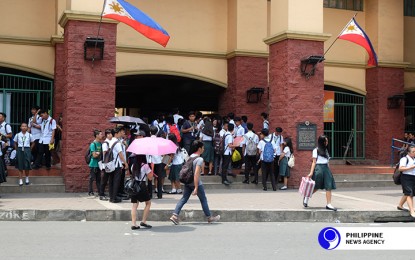
MANILA -- The Department of Education (DepEd) seeks to improve the quality of basic education in the country after the Philippines got a poor ranking in the Programme for International Student Assessment (PISA) 2018.
In a statement Wednesday, the DepEd said the Philippines joined PISA for the first time in 2018 as part of their reform plans on quality basic education.
The results of the assessment program, it said, would be used to establish a baseline to global standards and benchmark the effectiveness of succeeding reforms on education.
“The PISA results, along with our own assessments and studies, will aid in policy formulation, planning, and programming,” the DepEd said.
It said the PISA results, which reflected students’ performance in the National Achievement Test, showed the “urgency of addressing issues and gaps in attaining quality basic education in the Philippines.”
Launched on Wednesday, the “Sulong Edukalidad” program led by the DepEd would implement “aggressive reforms” to improve the country’s quality of basic education.
The program, the DepEd said, would focus in four key areas—the review and updating of the K to 12 program, the improvement of learning facilities, upskilling and reskilling of teachers and school heads, and the engagement of stakeholders, such as parents and guardians of students, for support and collaboration.
To ensure no student gets left behind in any part of the country, the department also called for national involvement in the program.
“DepEd calls the entire nation to take active involvement, cooperation, and collaboration in advancing the quality of basic education in the Philippines,” the agency aid.
On Tuesday, results of the PISA 2018, which compared the quality of basic education of the 79 member and partner countries of the Organization for Economic Co-operation and Development (OECD), showed the Philippines ranking at the bottom for performance in reading, and second-lowest for both Mathematics and Science.
The Philippines scored 340 points in reading, below the average of 487 points of OECD member and partner countries, 353 points in Mathematical Literacy, below the average of 489 points, and 357 points in Science, below the average of 489 points.
The PISA, launched by the OECD in 1997, is an international study that surveys its member and partner countries every three years for comparative data on 15-year-olds’ performance in reading, mathematics, and science.
According to the OECD website, each “cycle” of the study explores a distinct domain such as Collaborative Problem Solving (PISA 2015) and Global Competence (PISA 2018).
It added that the results of the study have informed policy discussions at the national and global level since its inception. (PNA)
